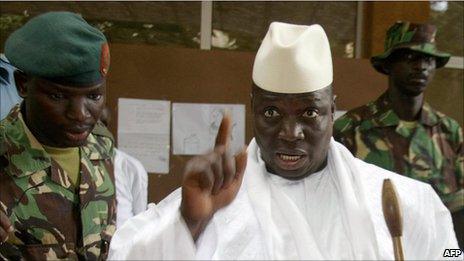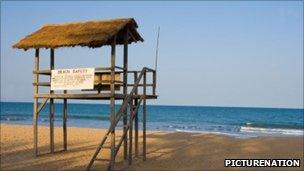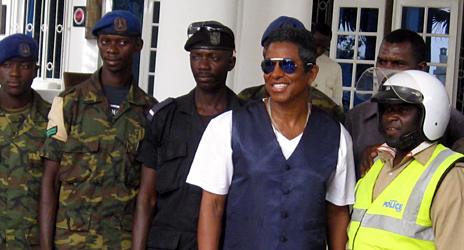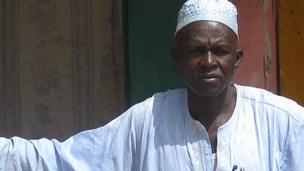Gambia: Praise singers and witch-hunts
- Published

The government says President Jammeh has brought development
The group of armed officers had reached reactively for their walkie-talkies as I walked up the steps towards courtroom number two in The Gambia's capital, Banjul.
Even though I was among a large group of journalists, some working for opposition newspapers, my white skin and BBC ID card singled me out.
"No entry," they said. "He may be hiding secret recording equipment. No foreign journalists allowed."
Despite my protests at this low-level disregard for The Gambia's constitutional rules, no-one around me seemed very surprised.
'Tortured'
The court in session was hearing the case of treason against eight former government officers, accused of plotting to overthrow President Yahya Jammeh.
All eight have since been found guilty and all are fighting last-ditch appeals against a sentence of death.
"We have credible evidence from many different sources that the accused have been tortured - at least three of them," says Etelle Higonnet of human rights group Amnesty International, external.
"The security forces use beatings on the genitals, places where the torture will not be visible. We've also heard that at least two witnesses at the trial were bribed and intimidated to give false witness."
Human Rights groups say hundreds of suspected opponents have been rounded up since the latest crackdown began in November 2009.
It is just the latest effort, they say, to suppress dissent in the country since President Jammeh himself came to power in a military coup in 1994.
The government would not comment on these allegations, however Culture and Tourism Minister Fatou Mass Jobe argues that the president has worked hard to improve life in what was one of Africa's poorest nations, for example by building several new schools and hospitals.

Tourism is The Gambia's main source of foreign exchange
"The level of development we have here is second to no other country in Africa. We have peace and stability," she told the BBC.
She did nothing, however, to dispel the accusations that Mr Jammeh is building up a personality cult, saying: "It's like a blessing that we have such a visionary leader."
The image of a police state is far from view on the beaches of Kololi, just outside the capital where tens of thousands of tourists come each year to escape the European winter.
This is The Gambia's main official source of foreign revenue.
It was in one of these beach hotels that President Jammeh held his birthday celebrations in May this year, featuring hours of films and stage performances paying tribute to the man who people say now rules this country with an iron fist.
The guests this year included the US popstar, Jermaine Jackson, who had brought an entourage of 57 people, including several of his children, from Los Angeles at the president's invitation.

Jermaine Jackson (in glasses) says President Jammeh makes Gambians smile
He seemed oblivious to the reports of torture and extra-judicial killings.
"He's not just a politician, he's a wonderful, genuine person," enthused Mr Jackson, a convert to Islam, who is keen to highlight the connection of African Americans like himself to this former slave coast.
"It's always the people abroad who want to say bad things about this country. The president is doing a wonderful job, and putting a smile on the faces of the people."
I didn't see many smiles when I visited the villagers of Jambur, a community just 80km (50 miles) from Banjul.
'Evil-smelling concoction'
This was one of a number of villages involved in a bizarre government crackdown last year, which reveals another aspect of President Jammeh's government.
Troops and government militia entered the village seeking out suspected witches.

Omar Bojang survived the questioning but at least six people died
The rumour goes that the president's aunt had recently died and he suspected a spell had been cast on her.
Dozens of elderly citizens, including the village imam, were rounded up and taken by bus to a military compound nearby.
"They made us lie on the floor and drink some kind of evil-smelling concoction," said Omar Bojang, one of those arrested.
"People started falling over, many were just babbling all kinds of nonsense."
After two days of incarceration, the 65 old people of Jambur were returned home, many in a delirious state.
Two of them died within hours in Jambur, and at least four others in nearby villages. Even today many still complain of routine stomach pains and other related ailments.
What is striking is that this kind of arbitrary repression goes almost completely unanswered.
Despite exhaustive testimony from hundreds of witnesses, the Gambian authorities have not either acknowledged or denied that the witch-hunt ever took place.
Nor will they comment on other idiosyncrasies of the president - such as his claim back in 2007 that he had invented a cure for HIV-Aids using local herbal remedies.
He has never produced any proof, or allowed any independent verification for this claim. The president himself has not given interviews to anyone except his own state-sanctioned media for several years.
He is standing for a fourth presidential term in office next year.
Such is the mood of fear, as well as his tight grip on the courts, the police and most of the media, that few expect any opponent to mount a serious challenge.
Listen to Ed Butler's report from The Gambia for the BBC World Service's Assignment programme.
- Published15 July 2010